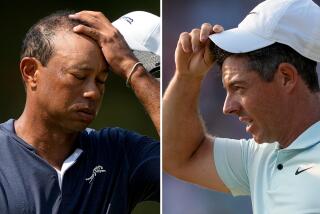Another Golf Season Beckons
- Share via
CARLSBAD, Calif. — Only two weeks after the close of the 1991 PGA Tour, the longest season in pro sports begins its run into 1992 next weekend.
As usual, the elite, winners-only Tournament of Champions serves as the kickoff event for the American tour.
Before the international schedule comes to an end in mid-December, a number of intriguing questions involving players and competiton will be answered on golf courses around the world.
Can John Daly really compete with the best in the game? Can Curtis Strange and Greg Norman and Mark Calcavecchia make comebacks? What will the season hold for Ian Woosnam and Nick Faldo and Seve Ballesteros? Will Fred Couples reach his promised potential?
The answers will come from some 160 international tournaments, from the 121st British Open at Muirfield, Scotland, the Masters at Augusta, Ga., the U.S. Open at Pebble Beach, Calif., and the PGA Championship in St. Louis.
But more important, more vital questions concerning the shape and control and future of the game will be determined in boardrooms and courtrooms and, possibly, backrooms.
It could be a pivotal year for pro golf.
“Possibly the most critical year we’ve ever seen,” PGA Tour spokesman Sid Wilson said.
Commissioner Deane Beman faces at least three major problems:
-- A $100 million suit by Karsten Manufacturing, makers of the Ping golf clubs. It concerns the PGA Tour’s attempt to ban the use of the so-called square-grooved clubs in professional tournament competition. At stake, however, is the rules-making authority for golf and, essentially, control of the professional game. It is expected to come to trial in mid-summer.
-- The formation of a union by the tour’s field staff officials. The union is led by Richie Phillips, the Philadelphia attorney who took major league baseball umpires out on strike. Formal contract negotiations are expected to start soon. And Phillips has warned: “Any time you have contract negotiations, a work stoppage is a possibility.”
-- A wait-and-see situation with the IRS concerning the tax status of commercial sponsors of sports events. An IRS ruling involving the sponsors of two college football bowl games could -- if extended to golf -- have a severely adverse effect on the sponsorship of pro tournaments.
The game already is feeling the pinch of the economic recession. Total purses on the American tour this year are expected to increase by about $1 million, the tour said. By way of contrast, purses increased $21 million in the four-year period ending in 1991.
The growing Senior Tour, however, remains more robust. The over-50 circuit anticipates a 10 percent increase this year with purses going up $2 million to a total of $22 million.
In another area, the increasingly international nature of the game is drawing more leading American players away from domestic events to harvest the rich guarantees allowed in foreign events.
For examples, look to U.S. Open champion Payne Stewart, Masters champion Woosnam and the new, rich, year-ending World Championship held in Jamaica two weeks ago.
Stewart, who spent most of the summer playing in Europe, said he will pass up the Tournament of Champions to play in Australia. Woosnam said he is over-played and over-tired and also is likely to skip the Tournament of Champions.
And, too, there’s the simple fact of the existence of the $2.5 million World Championship, an independent, non-aligned event. Many leading players -- Woosnam, Ballesteros and Norman among them -- see and enthusiastically support it as the first step toward a world tour, over and above the existing tours in the United States, Europe, Japan and Australia.
Daly, who gained instant celebrity with the awesome power that produced the upset of the season in his PGA victory, wound up his frantic season on a less-than-positive note in Jamaica.
He was disqualified under some questionable circumstances after shooting 87 in the first round, picked up his $50,000 guarantee and went home, complaining of burn-out.
Whether he can continue to build on his sudden success will be the subject of scrutiny and debate throughout the 1992 season.
Of equal interest will be the fortunes of Norman, Strange and Calcavecchia. Norman, the star-crossed Australian who has been so close so often, is coming off the first full season of his career in which he failed to win a tournament. Strange has not won since the U.S. Open of 1989, and Calcavecchia has not won since the British Open of the same year.
On a more positive note, there’s Couples, probably the outstanding American player in 1991, who now needs a major-tournament title to confirm his stature in the game.
Intriguing questions all.
But the bigger, more far-reaching questions may be asked and answered by judges and attorneys, administrators and executives and negotiators far removed from the players and the competitions on the golf courses of the world.
More to Read
Go beyond the scoreboard
Get the latest on L.A.'s teams in the daily Sports Report newsletter.
You may occasionally receive promotional content from the Los Angeles Times.










